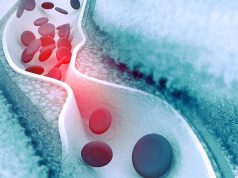Increased risk for Alzheimer disease and younger age of onset seen with APOE ε3 R145C missense variation
By Elana Gotkine HealthDay Reporter
WEDNESDAY, Feb. 22, 2023 (HealthDay News) — For individuals of African ancestry, the APOE ε3 R145C missense variant is associated with an increased risk for Alzheimer disease (AD), according to a study published in the Feb. 21 issue of the Journal of the American Medical Association.
Yann Le Guen, Ph.D., from Stanford University in California, and colleagues examined whether amino acid changes to APOE specific to individuals of African ancestry modulate the risk for AD. The study combined a case-control study using a sequenced discovery sample (stage 1; 2,888 cases and 4,957 controls) followed by two microarray imputed datasets (stage 2, internal replication [1,201 cases and 2,744 controls] and stage 3, external validation [733 cases and 19,406 controls]). Two APOE missense variants were assessed (R145C and R150H). Individuals included in the study were of African ancestry.
The researchers found that R145C was present in 4.8 and 1.5 percent of participants with AD and controls in stage 1 and was associated with an increased risk for AD (odds ratio, 3.01; 95 percent confidence interval, 1.87 to 4.85) and reported younger age at AD onset (β, −5.87 years). In stage 2, the association with increased AD risk was replicated; R145C was present in 4.7 and 2.7 percent of those with AD and controls (odds ratio, 2.20; 95 percent confidence interval, 1.04 to 4.65), with concordant results observed in stage 3 (R145C present in 3.8 and 2.7 percent, respectively; odds ratio, 1.90; 95 percent confidence interval, 0.99 to 3.64). In stages 2 and 3, the association with earlier AD onset was also replicated (β, −5.23 and −10.15 years, respectively).
“With additional external validation, the findings may inform AD genetic risk assessment in individuals of African ancestry,” the authors write.
Copyright © 2023 HealthDay. All rights reserved.








